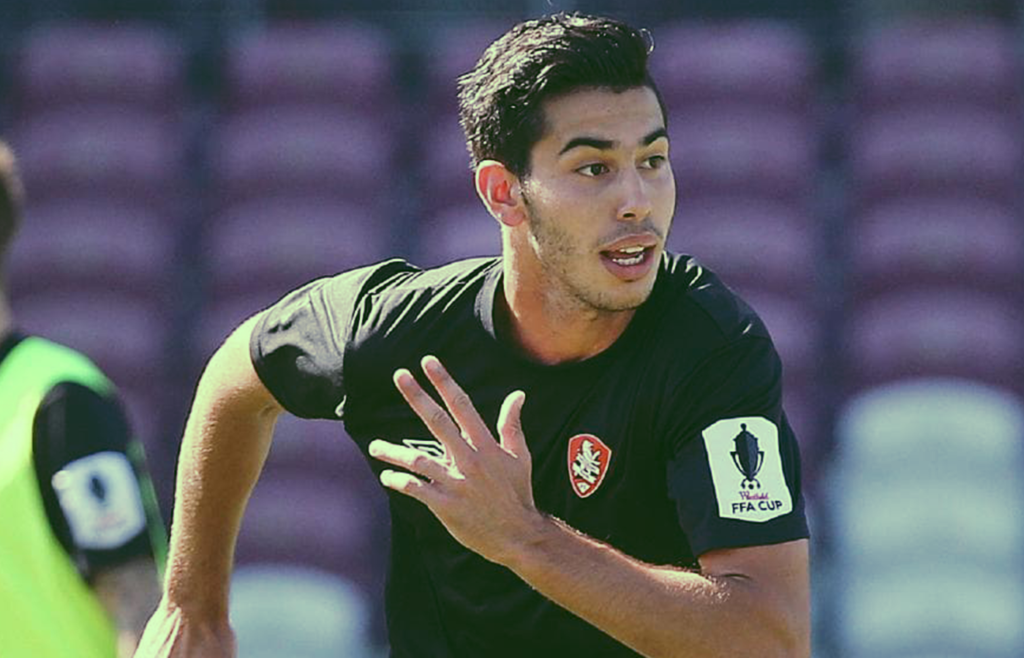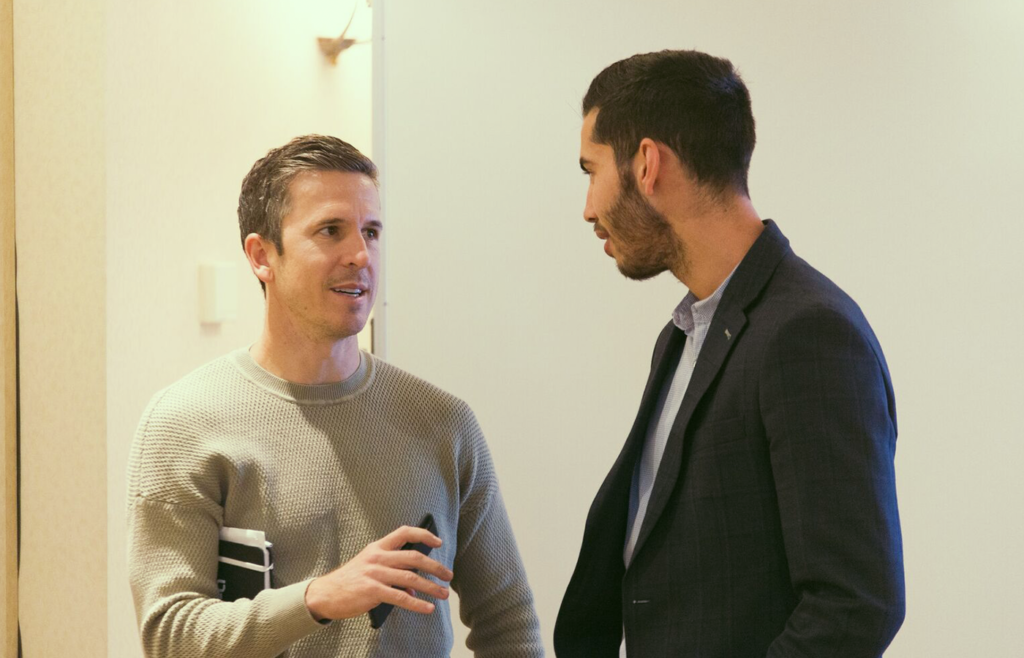Former Brisbane Roar midfielder George Lambadaridis knows the importance of planning for life after football. When he suffered an ACL injury in his second season with the Roar he had to comprehend the volatile nature of a career as a professional footballer. But the setback cultivated a determination to pursue an education to plan for his future, and it led to George graduating from Monash University with a Bachelor of Business. George also obtained a diploma in finance and mortgage broking.
After featuring in the line up of speakers at the 2019 PFA Player Development Camp, George, who now plays for Victorian NPL side Bentleigh Greens, wants to help Australia’s professional players develop financial literacy skills, through his new career. We caught up with George following the camp in July…

Q: What is your current job and how did you position yourself to obtain a position within the finance industry?
GL: I currently run two businesses; one being mortgage broking and the other centred around financial literacy. One led to another as when I sat down with people to organise their lending needs it made me realise, they needed far more than just helping them get a loan. It astounded me how very little knowledge most people had in general around their finances.
Q: Explain to us what happened when you finished up with your professional football career and about your move into finance?
GL: During my career, I was always also very focused on my education and using my time effectively, which is something I’m grateful to my parents for instilling in me. A long-term injury also encouraged this.
Thankfully I completed my Bachelor in Business and Commerce studying on a part-time basis and Certificate and Diploma in Mortgage Broking while I was still playing. Towards the end of my career, I also spent time being mentored by one of the best in the industry who I can now proudly call my business partner. I shadowed him for over a year – day and night – without making a dollar before I was even ready to begin working with people.
This was a sacrifice, but the advice I give to a lot of players now is to invest in themselves while they continue to play to also take advantage of their profile.

Q: Did you use your education in financial literacy to overcome your set-backs and refocus your ambitions?
Yes, absolutely. I didn’t have much to show financially at the end of my professional career and therefore understood I also needed to implement many of the skills I learned into my everyday life.
My lessons from football always stick with me such as commitment, discipline and resilience. In the beginning, it was like learning to kick a ball again, with not only having to understand the core content, but how to be comfortable running meetings, dealing with customers, creating referral partners and strategising the businesses next steps.
Football has also given me so much on the business side of things too. Having football in common when dealing with people is so powerful. It makes it so much easier to connect as so many people love our sport.
Q: What drew you to a career in finance?
GL: Initially, my father was involved in the industry and I found talking to him interesting, but I must say the passion comes from interacting with people. Finance is such a critical component of every individual’s life and everyone has different values, beliefs and behaviours towards it. This is what makes it so fascinating. Everyone’s situation is so unique which makes every interaction exciting and most importantly, rewarding when someone is able to achieve their goals.
I get to meet and help everyone from the young student, the tradie, the doctor, the pro athlete, the politician, the billionaire to the retiree and everything in between. Every day is different and when you think you’ve seen it all – you haven’t.
Q: How have you found the transition to full-time work outside of professional football?
GL: This was initially very challenging physically as much as mentally. Initially, it feels really strange realising you’re not going to just get up and train every day.
Maintaining my football career however has been so important to keep balance in my life. I am currently playing in NPL Victoria for Bentleigh Greens. Unfortunately, football doesn’t allow you to entirely switch off, but it is definitely a release for me as when I’m on the park I can forget all the issues I’ve had to deal with during the day and can have a laugh with my teammates.
The biggest challenge is now balancing time between training and work commitments which I’m juggling all the time.

Q: How did you first become involved in the 2019 PFA Player Development Camp?
GL: I was always passionate about working closely with the PFA from the moment I entered this line of work. I was always so grateful to the PFA for their assistance throughout my career but felt there was such a gap in financial literacy that was never properly addressed. I care about the growth of the game in this country and know how important this topic is to players often with many of them too fearful to express it. Thankfully PFA also has identified the same issue and has been very supportive in providing this service to members. I feel I can make a big contribution in this area and relate to players through my own personal experiences.
I found listening to Craig Foster’s opening speech at the Camp very inspiring. He touched on the importance of growing the game not just on the park but off it, by striving to be the most ‘educated’ sporting code. He mentioned that a goal of the PFA is to have players sitting in front of him as future leaders of the sport. Although financial literacy is only a component of that, I hope I can play a major role in helping others achieve it.
Q: Were you excited to share some of your insights with the players?
As much as I’m so grateful to be standing up in front of a big group of players and sharing my knowledge it’s actually not what drives me, as this is not really what creates impact, but more so an initial exercise just to get the players thinking and inspire them.
When I look across the room presenting, I notice the young player who just received their first contract, the W-League player juggling multiple jobs and traveling around the world to make a living, the footballer playing overseas through to the player with a family looking to transition out of the sport shortly. Each athlete requires their own attention and my only way to truly connect with everyone is to hear their story and what they value.
Q: How did the players respond to your insights? Have many sought help from you before and after?
GL: Yes, many players have reached out to me before and after the presentation for support as many have also followed my progress since transitioning out the sport and were players I had played with or against. Being approached by new players is also really exciting as it reminds me of myself just starting out as a footballer.
Discussing an athlete’s finances, is such an interesting discussion in an environment amongst other players as internally it is such a major consideration for everyone. However, it can be tough for players to say they that need help or ask for guidance, especially amongst others. I try to make myself available for players to reach out privately for this reason.
I’ve found it also goes beyond just dealing with the athlete. It is also important to educate those around them such as their partners and parents who are also such a major part of their support network.

Q: What were you were hoping they would get out of your presentation and panel discussion?
GL: Simply to not bury their heads in the sand and take ownership of their own futures. A football career is short and the need to maximise their time on and off the pitch is critical.
Q: How important is it for current and past players to ensure they consider their financial situation?
It is critical from day one of their careers. From the first contract on minimum wage to establishing themselves as a professional athlete, the good habits need to be embedded early on. Without addressing their financial situation there is a high likelihood of encountering financial stress. In dealing with athletes across multiple codes, we are seeing far too many struggle with mental health issues and also forced to walk away from the game with nothing.
GL: What can players do if they would like help in terms of managing their finances?
One of the most important messages I share with players is to evaluate who are their trusted advisors. As an example, an accountant that just does a simple tax return with no advice around helping grow wealth or a mortgage broker who simply organises a loan without strategy around how to actually pay it off is no good to an athlete with a small window of opportunity. It is no different from an athlete with an average coach or physio. You want to be working with the best and you want them working in synergy with one another towards your goal.
Reaching out to the right people is the best advice I can give as too often we are afraid of asking someone for help. Part of my role is to address these issues with players.

To contact George about financial literacy or margate broking email: info@australianmoneymentors.com.au







